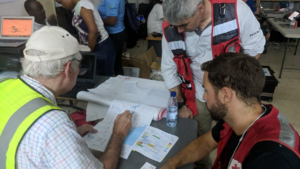Emergency response
24 hours a day, 7 days a week, 365 days a year, anywhere in the world – MapAction is ready to help
When major emergencies happen, we can provide surge support to our partners at short notice, enabling them to make sense of chaotic, dangerous and rapidly evolving situations and coordinate the most effective response. We work both in country and remotely.
Our well-rehearsed deployment model means our mapping professionals can be on the scene within 24-48 hours of a disaster striking. Even before they arrive in-country, they’ve started collecting data and information that will be crucial in helping coordinate the world’s response, and getting aid to where it is needed most.
We’re also working to ensure the vital data and maps that are needed in virtually any emergency situation are pre-prepared so they can be available straight away to the highest possible quality.

Our intensive training programme means all teams are always up-to-date and prepared.
As the situation on the ground evolves, our volunteers help national authorities, aid agencies and emergency teams understand the fast-changing needs of affected communities. It is challenging, but vital work.
Since 2003, MapAction has responded in country to more than 150 humanitarian emergencies, ranging from earthquakes to conflict-related crises.
“The team’s work was greatly appreciated by the Government and the United Nations Country Team, as well as by UNEP and OCHA, for the contribution it made in identifying and assessing the immediate life-threatening environmental risks and hazards and the initial priorities for environmental response.”
Sebastian Rhodes Stampa, Chief, Emergency Response Section (ERS), UN Office for the Coordination of Humanitarian Affairs, following the response to the La Soufrière volcanic eruption in April 2021

